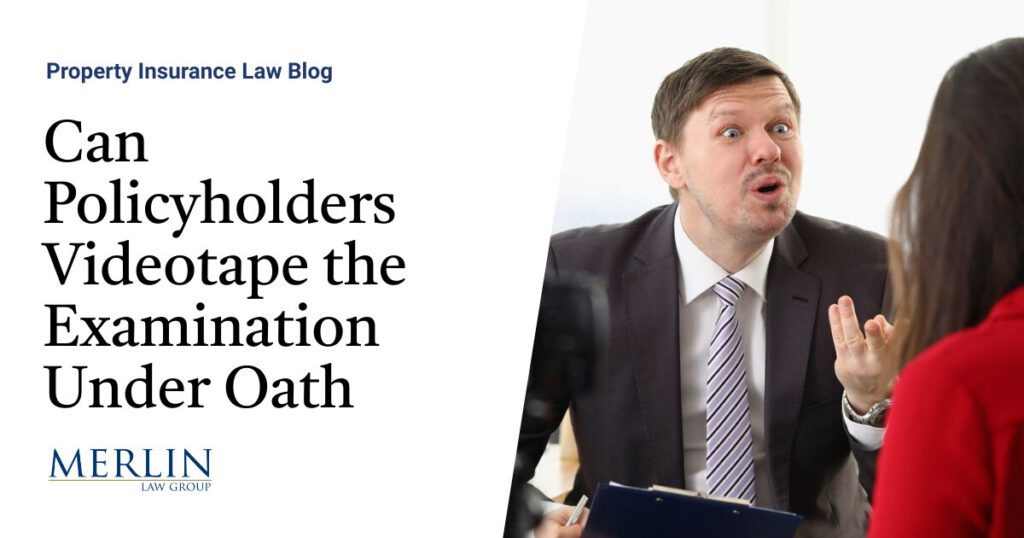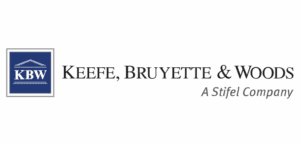Can Policyholders Videotape the Examination Under Oath?

Policyholders in California have a right to videotape the examination under oath. Indeed, nothing in the insurance policy prevents the policyholder from videotaping the insurance company representatives during the examination under oath. Why would any insurer acting in good faith be afraid of its representatives being videotaped during an examination under oath? If the insurance company can videotape the policyholder during an examination under oath, why cannot the policyholder do the same to the insurer?
Nationwide Insurance Company objected to its claims investigators being videotaped during an examination under oath. A California appellate court would not have any of it and further noted the history and need for policyholder consumer protection during the claims process:1
Existing legal protections for insurance policyholders proved to be inadequate after the Northridge earthquake. The public requires additional safeguards against unfair claim settlement practices by insurance companies. It is the intent of the Legislature that the provisions of this act add basic consumer protections to those currently set forth in the Insurance Code and supporting regulations.
As the bill’s author explained, ‘Existing law needs to be modernized. It allows insurers to use lawyers to delay claim settlements, conduct fishing expeditions, intimidate and harass innocent consumers while ostensibly investigating their claims, but provides few balancing protections for claimants.’… Other supporters of the bill similarly contended ‘that the current EUO process was enacted in 1949 and gives ‘virtually unlimited investigation rights to insurance companies’ with little consumer protection.’ …’The author introduced this bill to address concerns by property owners who had been subjected to abuses by insurance companies during the insurance claim process, including individuals and victims of the 1991 Oakland firestorm and the 1994 Northridge earthquake. [T]he bill establishes basic due process rights for insureds who are subjected to EUOs,’ among other protections…Thus, the legislation was intended to not only enhance the process due an insured but also provide consumer protection provisions, such as the right to record.
To be sure, the legislative history does not explicitly address whether section 2071.1(a)(4) encompasses the right to video record the insurer’s representatives. However, it demonstrates an express and unequivocal intent to protect insureds from harassment in EUO proceedings, and this purpose is served by granting insureds such a right. Significantly, video records nonverbal conduct, such as eye-rolls or glares, which would not be captured by audio recordings or reporter’s transcripts…In addition, the knowledge that a person is being video recorded may prompt that person to modify their behavior in a positive manner. (Cf. ibid.
.) ‘ ‘[C]ivil statutes for the protection of the public are, generally, broadly construed in favor of that protective purpose.’ ‘ (Pineda v. Williams-Sonoma Stores, Inc. (2011) 51 Cal.4th 524, 530, 120 Cal.Rptr.3d 531, 246 P.3d 612.) Granting insureds the right to record the insurer’s representatives furthers the Legislature’s purpose to protect insurance consumers from harassment during EUOs. For this reason, we reject Nationwide’s argument that video recording an insurer’s representatives is unreasonable.
In addition, the legislative history reveals the Legislature expanded the scope of an insured’s right to record EUOs during the amendment process. As initially introduced, the bill amended section 2071, which sets forth the standard form of fire insurance policy, to afford an insured subject to an EUO the right to ‘tape-record the examination.’ Subsequently, the bill was amended both to apply the EUO protections more broadly to all property insurance policies, and to expand the recording right to encompass the right to ‘record the examination proceedings in their entirety.’ …This expansion of the right to record—from ‘tape-record[ing]’ to ‘record[ing]’ and, more significantly for our purposes, from ‘the examination’ to ‘the examination proceedings in their entirety’—reveals a legislative intent that the insured’s right to record the EUO proceedings be comprehensive. We see no basis to exclude from this broadly phrased and intentionally expanded right the right to video record the insurer’s representatives.
… Nationwide also asserts there is no need to video record the insurer’s participants because the questions asked by the insurer’s representative will be captured by the reporter’s transcript or on the audio portion of any video recording of the insured. As we have already discussed above, these methods do not capture nonverbal conduct, which may be intimidating or harassing.
Harassment and intimidation by insurance companies, and especially their “dog on a leash” lawyers, is never proper.
A big shout-out goes to Amy Bach and United Policyholders, who not only successfully fought for these policyholder protection laws over 25 years ago but also filed an amicus brief in this case.
If you have general questions about examinations under oath, use the search function in this blog. If you have a specific question about an upcoming examination, please contact a Merlin Law Group attorney for preparation and help. Policyholders should remember that the insurance company is usually taking the examination under oath to gather facts to deny or limit your claim. These are important claims proceedings for which policyholders need qualified legal representation and preparation.
Thought For The Day
All representatives of your insurance company are legally required to tell you the truth. This includes in-person conversations and all communication by phone, letters, emails and all advertising and printed materials.
—United Policyholders
1 Myasnyankin v. Nationwide Mut. Ins. Co., — Cal.Rptr.3d — , 2024 WL 340287, (Cal. Ct. App. Jan. 30, 2024).


